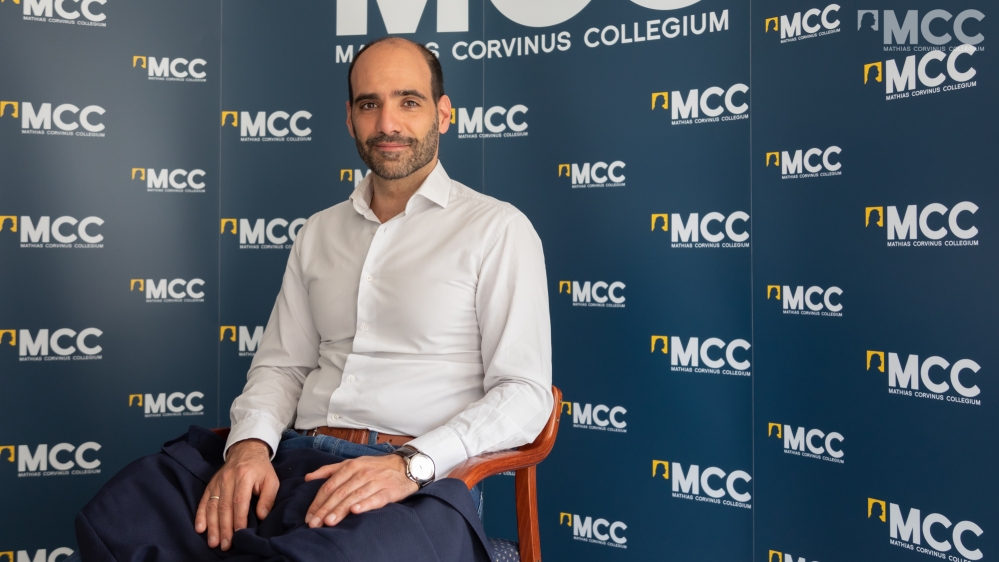For years, the French have been claiming that they have the dumbest right in the world. But hasn’t the title of the World’s “Dumbest Right” just been stolen from them by the Spanish? I’m thinking in particular of the People’s Party, the center-right PP…
I think the question does arise for the PP. The results of the Spanish elections are the consequence of an absolutely catastrophic strategy and also of some fear, an inferiority complex in relation to the mental framework imposed by the left.
The PP has not dared to assume a possible coalition at the national level with its natural electorate. The truth is that people who vote for Vox today were the People’s Party voters 10 or 15 years ago. The PP’s reluctance is all the more absurd given that it now has coalitions with Vox in several regions.
But the PP’s idea for the general elections was to demonize Vox to attract voters. However, the exact opposite actually happened. It mobilized a moribund left that woke up to the cry of fascist wolf. The left was the first to cry wolf, but this was amplified by the PP, with whom Vox now has agreements at the regional level.
The result was a communicative cacophony that also contributed to the defeat of the right. The PP’s strategy was indeed completely stupid. It was totally counterproductive and is going to cost the country dearly.

The PP has thus failed to win back the Vox electorate in Spain. Perhaps it should have asked Hungary’s Fidesz for advice first. Hasn’t Fidesz managed to recapture part of the former electorate of Jobbik, the formerly nationalist party on its right? Is there a Hungarian lesson for PP?
There is certainly a Hungarian lesson for the PP, but not concerning Jobbik’s regression. Jobbik committed hara-kiri all by itself. It was a far-right party that allied itself with the socialists, former communists, and Momentum’s woke activists in a coalition whose only common denominator was that it was anti-Orbán. Its voters made it pay dearly for this. Fidesz didn’t have to do anything for this to happen, and Jobbik was replaced on the right of Fidesz by Mi Hazánk, a nationalist party that entered parliament at the last elections with a small group of deputies.
But perhaps there are other lessons to be learned from Hungary, not just for the PP in Spain and Les Républicains (LR) in France, but for the whole of the Western European right. Indeed, the entire Western European right is completely subordinated, sometimes psychologically conditioned, to the hegemonic cultural framework of the left.
The first lesson they could take from the Hungarian right is to abandon their complexes, stop being afraid, and stop always referring to the frame of thought of their political adversaries.
Is this what Fidesz did to return to power after its 2002 defeat?
In my opinion, yes. And what makes Fidesz so successful is that it has been able not only to challenge the left’s mental, psychological, and cultural framework to win elections but also, later on, to govern. In the Fidesz party, they are “thinkers” but also “doers.”
The day it returns to government, the Spanish People’s Party will also have to learn this lesson.
The PP enjoyed an absolute majority from 2011 to 2018, under Mariano Rajoy. It only used it to deal with unemployment and economic management. This was very necessary at the time, but the PP did not dare to take on the cultural battle with that absolute majority, which it will never enjoy again.
The second lesson from Hungary for the PP is that you shouldn’t be afraid to look to your right. With 3 or 4 million voters in Spain voting for Vox, the PP needs to stop being “more papist than the Pope” when it comes to demonizing this party. It cannot afford to maintain a cordon sanitaire around Vox. “Cordon sanitaire” is in itself a despicable expression that should not exist in a democracy, and should not even be used.
The Hungarian lessons are lessons in common sense, in basic political logic that the Western right, for fear of what people will say, dare not take.
The same applies to the European People’s Party, which for two terms now has assumed that its role is to vote in the European Parliament with the liberals, socialists, communists, and greens. Anyone but the conservatives.
In Spain, Vox has all the major media outlets against it. The PP does not have all the media against it, but it feels obliged to sound progressive so as not to have them against it. It is the same situation as in France or Germany, where the mainstream media are almost all in the camp of the liberal left. Fidesz lost the 2002 elections in a similar situation. It had most of the media, which were also almost all left-wing in Hungary, against it. How did it manage to change its situation in that respect? Is there a Hungarian lesson here too for Western European right-wingers?
I do not exactly know what made the wind change direction after 2002 so that Fidesz could return to power. But what I know perfectly well is that once the Fidesz people came back to power, they said to themselves: “I got fooled once, I won’t get fooled twice.”
There is an expression here in Hungary, in the ranks of Fidesz, to refer to the period from 1998 to 2002: “We were in government but not in power.” After their victory in 2010, they decided not only to be in government but actually to be in power.
Power is not just government, it is everything that goes with it, and you need the political will to exercise that power, including with right-wing media that can explain the actions of Fidesz governments in a more or less objective way, something the left-wing media will never do. There is a lot of talk these days about social media helping to short-circuit the mainstream media’s hegemony, but that is not enough.
[pp id=78149]
One of the great lessons of the Spanish election is that the legacy media – the press and especially television – can have an absolutely decisive effect. If it hadn’t been for the vast majority of the media, including those very close to the PP who had received instructions from the People’s Party to demonize Vox, the election result would undoubtedly have been very different.
However, after 13 years of Viktor Orbán’s government, how does pluralism in Hungary compare with Spain?
Contrary to popular belief, the Hungarian media landscape is actually much more plural than that of Spain. In Spain, there isn’t a single major TV station that won’t put Vox under constant attack, for example. And you don’t have a single major TV station that is going to be openly in favor of the People’s Party. The vast majority of TV stations in Spain are openly left-wing and openly pro-Sánchez or pro-left coalition.
As for the public media in Spain, public television has been completely colonized by the left. In fact, this was Pedro Sánchez’s first measure when he came to power in 2018: He immediately scuppered an agreement that existed at the time in the Spanish parliament to appoint a director of Spanish television based on mutual consent. Sánchez came and imposed his candidate, who was a former journalist with strong left-wing leanings.
What about Hungary?
In terms of television, for example, there is clearly more pluralism in Hungary. The situation is certainly not ideal, but alongside a government-controlled public channel, you also have a private channel that is the biggest and most-watched television channel, and it is openly anti-government. This means that if you watch television in Hungary, when one channel tells you something, the other tells you the opposite. In Spain, all the channels tell you the same thing.
[pp id=76923]
And even in the print media, things are much more balanced in Hungary than people give them credit for. There is a clear dominance of conservative newspapers in the local press outside Budapest and the big cities, but it is much more balanced in the national press. And then of course there is the Internet, with Hungary’s major online sites being predominantly left-wing.
So you could say that Fidesz has imposed pluralism, which did not exist in Hungary either, right? In 2006, this even caused riots because Hungarians had had enough of the media lying to them.
Exactly.
They even set fire to the headquarters of public television in their exasperation.
As far as I know, this was indeed the reason. It was a clear sign of citizen exasperation, but not something to be recommended.
Indeed, this is not one of the Hungarian lessons to be followed, but there are others, more positive and constructive. I am thinking in particular of the cultural war waged by the left in the West. We are here at the MCC Feszt, which is a very special festival. For the past three years, it has been held in Esztergom, 50 kilometers from Budapest. You see a lot of young people there because there are concerts and festive evenings, but there are also very serious discussions during the day, for three days in a row. Even though the speakers come from a wide range of backgrounds, conservative views are clearly dominating the discussions. Is the festival organized by the Mathias Corvinus Collegium an instrument of cultural warfare against the left?
It is counter-culture, and it is done in a very spontaneous and natural way. This festival takes place in a very friendly atmosphere. There are concerts with the best Hungarian bands and tens of thousands of festival-goers.
It should not necessarily be seen as a political festival. People come here mainly to have fun and, at the same time, they can indeed listen to opinions that people don’t get to hear in Western Europe. Forty thousand in all have come to the MCC Feszt this year!
It is an example of counter-culture, and the MCC itself is also an example of counter-culture in the face of an academic world colonized by woke thinking and cancel culture — admittedly less so in Hungary than elsewhere, but in the social science faculties in particular, universities in this country are also markedly left-wing.
[pp id=8974]
Of course, in Hungary, it never happens that a mob of left-wing students prevents a right-wing lecturer from speaking. We are not at the level of censorship you might find at Sciences Po in France, or Cambridge and Oxford in England.
And in Spain?
This is less the case in Spain than in the Anglo-American world, but much more so than in Hungary. In Spain, it is mainly the world of culture and cinema that is rabidly leftist.
So here is another lesson from Hungary, perhaps one for the right-wingers of Western Europe to follow when they come to power: Mathias Corvinus Collegium, or MCC, which offers both free university accommodation and complementary courses with a conservative outlook to students from all those universities colonized by left-wing ideologies. And there is this unique annual festival organized by MCC in Esztergom…
These recipes have been applied in Hungary since 2010. In this country, the conservative counter-model has not only been conceived, it has been implemented. There are plenty of concrete examples of what can be done in the face of left-wing domination.
In the cultural sphere, for example for the protection of folklore and the management of cultural institutes, there have been real battles. Among other things, Fidesz has succeeded in opening up the management of theaters, which used to belong to a small, very urban clique in Budapest. It has opened up this management to other circles too. It is a very positive thing indeed. All models are here, in Hungary.
I wonder, though, if Hungarian society isn’t inherently more conservative than Spanish society. Isn’t this above all why Fidesz’s action has worked so well in Hungary?
It is indeed important not to simply copy and paste. Every country is different, with its own historical traditions and different historical origins.
You cannot culturally compare a country that lived under Communism for 45 years with a country like Spain, which had the opposite experience, with a right-wing authoritarian dictatorship for almost 40 years.
Moreover, unraveling 45 years of left-wing cultural hegemony in Spain is extremely complicated. It is a long-term job that cannot be done by the government alone. A real cultural battle also involves civil society and other sectors.
However, the cultural battle also involves triggering a change in mentality. This was achieved in Hungary thanks to Viktor Orbán’s strong leadership, but not everyone is Orbán.
In the meantime, civil society can already organize itself as the MCC did in the past. It was actually created in 1996 by a handful of families, and it later developed year after year before literally booming over the past three years.
It is a very long-term process which, in Western Europe, will take time, and in some cases may even have to be much more disruptive.
Rodrigo Ballester is a Spaniard who spent his younger years in France and now lives in Hungary, He currently serves as the head of the Matthias Corvinus Collegium’s Center for European Studies in Budapest. He is also a lawyer and a former EU civil servant who worked in the European Commission from 2008 to 2019.





